CONTENTS
PART 1
Common Expressions & Key Words PART 2
Places PART 3
General Word List
ABOUT TUTTLE
Books to Span the East and West Our core mission at Tuttle Publishing is to create books which bring people together one page at a time. Tuttle was founded in 1832 in the small New England town of Rutland, Vermont (USA). Our fundamental values remain as strong today as they were thento publish best-in-class books informing the English-speaking world about the countries and peoples of Asia. The world has become a smaller place today and Asias economic, cultural and political influence has expanded, yet the need for meaningful dialogue and information about this diverse region has never been greater. Since 1948, Tuttle has been a leader in publishing books on the cultures, arts, cuisines, languages and literatures of Asia. Our authors and photographers have won numerous awards and Tuttle has published thousands of books on subjects ranging from martial arts to paper crafts.
We welcome you to explore the wealth of information available on Asia at www.tuttlepublishing.com . Published by Tuttle Publishing, an imprint of Periplus Editions (HK) Ltd. www.tuttlepublishing.com Copyright 1991 Boy Lafayette De Mente
Copyright 2004, 2016 Periplus Editions (HK) Ltd All rights reserved. No part of this publication may be reproduced or utilized in any form or by any means, electronic or mechanical, including photocopying, recording or by any information storage and retrieval system, without prior written permission from the publisher. LCC Card No.: 2009291154
ISBN 978-4-8053-1362-6
ISBN 978-1-4629-1852-2 (ebook) 20 19 18 17 16 5 4 3 2 1 1510CP
Printed in Singapore Distributed by:
Japan
Tuttle Publishing
Yaekari Building, 3rd Floor, 5-4-12 Osaki,
Shinagawa-ku, Tokyo 141 0032
Tel: (81) 3 5437-0171; Fax: (81) 3 5437-0755
www.tuttle.co.jp North America, Latin America & Europe
Tuttle Publishing
364 Innovation Drive
North Clarendon, VT 05759-9436 U.S.A.
Tel: 1 (802) 773-8930; Fax: 1 (802) 773-6993
www.tuttlepublishing.com Asia Pacific
Berkeley Books Pte.


INTRODUCTION
Overcoming Instant Illiteracy Hundreds of thousands of people who arrive in Japan each year go through an experience that is the equivalent of suddenly being struck deaf and dumb.

INTRODUCTION
Overcoming Instant Illiteracy Hundreds of thousands of people who arrive in Japan each year go through an experience that is the equivalent of suddenly being struck deaf and dumb.
They go from being literateeven brilliantin their own culture to not being able to speak, understand, read, or write the language of their host country, and to being equally ignorant of the nonverbal language of Japan as well. If this situation continues for any length of time, the experience results in a trauma known as culture shockwhich in extreme cases can cause serious mental and physical damage; sometimes even death. Short-time visitors to Japan are not likely to suffer significant health problems because of their sudden inability to interact with the culture surrounding them. But there is perhaps no more frustrating feeling than not being able to communicate with other people when we want to or need to. Where visiting businesspeople are concerned, the handicap of not being able to communicate directly with their Japanese counterparts, even on the most basic level, has far more serious implications. At a recent dinner in Tokyo with the president of an American company and his Japanese guests, the frustration of the foreign visitor was evident for all to see.
Finally, he said in utter exasperation: God! If I only knew survival Japanese! That is what this book is all about. Most people use fewer than 1,000 words of their own native language in going about their daily affairs. It is not so much how many words one knows but what those words are and how they are used. This is particularly true in the case of a second, foreign language. With a vocabulary of only 300 Japanese words you can communicate several thousand ideas not only enough to survive but also to enjoy yourself at the same time. Many Americans in particular seem to have a foreign language phobia.
Some have extreme difficulty in pronouncing a single foreign word correctly. This fear might be the result of cultural conditioning stemming from a deep-rooted feeling that speaking a foreign language is un-American; that it is a black mark that cannot be erased. Most Americans are now intellectually sophisticated enough to know this fear of foreign languages is invalid, and to recognize the social as well as economic benefits of being multi-lingual and multi-cultural. But they are still handicapped by the emotional residue of generations of trying to get away from any hint of foreignness. Survival Japanese provides you with words, phrases and expressions commonly used in the modern Japanese society, both in Romanized Japanese and in Japanese characters, together with a thorough note on pronunciation.
How to Use This Book Despite the forbidding appearance of Japanese when it is written in the Chinese ideograms known as Kanji or Chinese characters, the language is made up of precise syllables that are in fact quite easy to pronounce (people who are not familiar with the language confuse the difficulty of getting several words out in a smooth flow with a phonetic complexity that does not exist).
How to Use This Book Despite the forbidding appearance of Japanese when it is written in the Chinese ideograms known as Kanji or Chinese characters, the language is made up of precise syllables that are in fact quite easy to pronounce (people who are not familiar with the language confuse the difficulty of getting several words out in a smooth flow with a phonetic complexity that does not exist).
Unlike Chinese, Japanese is pronounced in a straightforward manner without complicating tones. The only variations in Japanese are double consonants and long vowels that require a slight change in pronunciation. The grammatical structure of Japanese differs from Chinese as well as English, but that does not make it more difficult to learn. Looking at the order of the subject, verb, and object in a Japanese sentence, saying it is backward and complaining that it doesnt make sense is foolish. Of course it makes sense. Japanese is a very flexible language.
You can switch the order of words and phrases around to a surprising degree, even leave things out and it not only makes sense but is acceptable in ordinary conversation. This can be a problem to those who want everything to follow one precise rule and regard this characteristic of the language as a serious complication. But looked at another way, it makes the language easier to use. There are three distinct levels of Japanese that might be called honorofic, formal and informal. These levels are different enough that they are practically dialects within themselves. It may be very difficult to become fluent in each of these levels because it is almost like learning separate vocabularies.
But being able to communicate effectively in formal Japanese is enough for the average foreigner to at least build a footbridge across the language gap. Survival Japanese is standard Japanese. I make only a few references to grammar. In the early stages of any language study it often serves only to complicate things. The secret to language learning is to mimic the way native speakers use it, without any thought of its structure. After a while the grammar becomes imprinted on your mind, and making up correctly structured sentences becomes automatic.

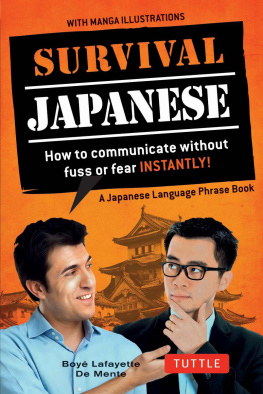

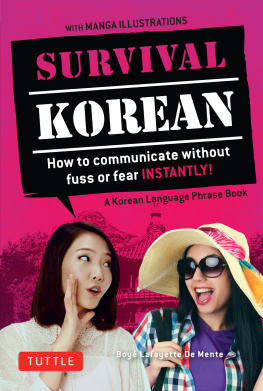
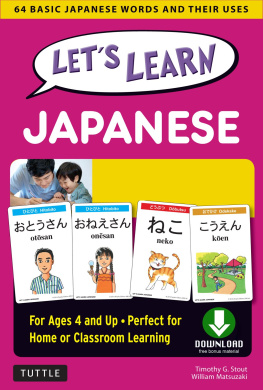

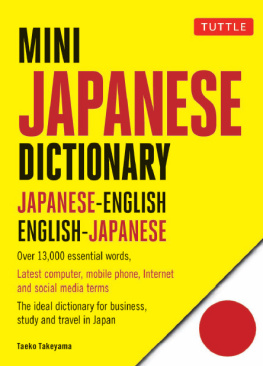


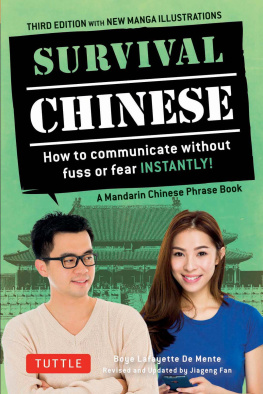
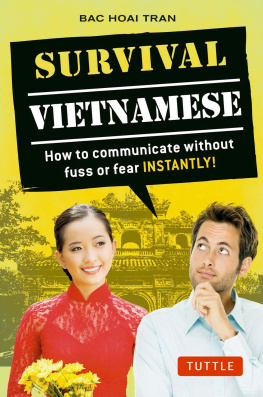


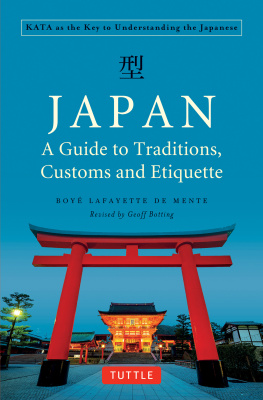

 INTRODUCTION Overcoming Instant Illiteracy Hundreds of thousands of people who arrive in Japan each year go through an experience that is the equivalent of suddenly being struck deaf and dumb.
INTRODUCTION Overcoming Instant Illiteracy Hundreds of thousands of people who arrive in Japan each year go through an experience that is the equivalent of suddenly being struck deaf and dumb.